UNIT 6:10 STUDY
Determine What the Word Could Mean
Why do we need to determine what the word could mean before we decide what it does mean? Because most words can mean several different things (e.g., “spring”), but will usually carry only one of those meanings in a particular context. By clarifying what a word could mean, we will not confuse the various meanings of a word when interpreting a particular passage of Scripture.
Consider this scenario. If, in the dead of winter, your friend says, “It’s so cold, I can’t wait until spring gets here,” he would be referring to the arrival of the much warmer season that immediately follows winter, not the arrival of a metal coil or an improved jumping ability. Imagine the absurdity of the statement, “It’s so cold, I can’t wait until my jumping ability improves.” You might begin to wonder if the cold had dulled your friend’s mental capacity.
Semantic Range
Once we see all the possible meanings of a word—what we refer to as a word’s range of meaning or semantic range—we will be in a better position to decide what the word actually does mean in a specific context. For example, let’s look at the semantic range of the English word “hand.” To find the range of meaning for an English word, just look it up in a standard English dictionary (also called a lexicon). A glance at the dictionary entry for “hand” reveals a range of meaning that looks something like this:
- the terminal part of the vertebrate forelimb (my right hand)
- a personal possession (it fell into the hands of the enemy)
- a side (on the one hand…on the other hand)
- a pledge (I give you my hand in marriage)
- a style of penmanship (this letter was written in my own hand)
- a skill or ability (she tried her hand at sailing)
- a unit of measure (the horse is fifteen hands high)
- aid or assistance (please lend me a hand)
- cards in a card game (I was dealt a bad hand)
- one who performs a particular work (they employ over fifty hands)
- workmanship or handiwork (the work of the master’s hand)
A word’s range of meaning (or semantic range) is a list of all the possible meanings of a word—that is, a list of what the word couldmean.
You might be thinking, “OK. All I need to do to find my word’s range of meaning is look it up in an English dictionary, right?” No, not really. You see, your word is an English translation of a Hebrew or Greek word, and that fact changes things. Since the Bible was not originally written in English, you are really trying to find the range of meaning for a Greek or Hebrew word, not the English word used in translation. You should use an English dictionary to find the meaning of an English word, but going straight to your English dictionary to find the range of meaning for a Greek or Hebrew word is a potentially big mistake.
Both the original-language word (Hebrew or Greek) and the English word used to translate it will have a semantic range. There will be some overlap between the semantic ranges of the two words; that’s what makes translation possible. But the ranges will not be identical. We must remember that they are different words and will almost always have different (but overlapping) ranges of meaning.
As an example, let’s look at a word Jesus uses in the parable of the talents: “Again, it will be like a man going on a journey, who called his servants and entrusted his wealth to them” (Matt. 25:14; cf. also 25:20, 22). If you look up the word “entrust” in your English dictionary, you will find a fairly narrow range of meaning:
a. to confer a trust on; to deliver something in trust tob. to commit to another with confidence
You may be surprised to learn that the Greek word paradidômi, the word the NIV translates “entrust,“ has a much broader range of meaning:
a. to hand over something to someoneb. to deliver someone into the control of someone else; to betrayc. to commend or commitd. to pass on traditional instructione. to grant someone the opportunity to do something; to allow or permit
The NIV can use the word “entrust” to translate the Greek word paradidômi because the semantic ranges of the two words overlap. In Jesus’ parable the master is “entrusting” in the sense of (a) in both lists above; that is, he is handing over (or entrusting) his property to the servants while he is away on a journey. In spite of this essential overlap between the two words, they are different words with different ranges of meaning.
Here things get tricky. We could get into interpretive trouble if we were to say, for example, that the English word “entrust” could mean “betray” (which it cannot) or that the Greek word paradidômi could never mean “betray” (which it can). We don’t want you to misinterpret by confusing the semantic ranges for different words. Avoid the temptation to pick just any meaning from a list of possible meanings and read that meaning back into the passage. Always keep in mind as well that the original-language word and the translation word are different words with different ranges of meaning that overlap to some degree. The overlap is what makes translation possible. Your task is to locate the point of overlap (something we will teach you how to do soon). Before that, how about one more example of a word’s range of meaning?
Suppose you want to study the word “confidence” in Hebrews 4:16: “Let us then approach God’s throne of grace with confidence, so that we may receive mercy and find grace to help us in our time of need.” If you go to the English dictionary you will find a range of meaning for the word “confidence” similar to this:
a. a feeling of one’s ability or powerb. a belief that a person will act in a proper or effective wayc. being certain about somethingd. a relation of trust or intimacy (i.e., to take someone into confidence)e. a secret (i.e., a communication made in confidence)
The NIV selects the word “confidence” in Hebrew 4:16 to translate the underlying Greek word parrçsia. Have a look at the range of meaning for parrçsia:
a. plainness, frankness (e.g., Jesus told his disciples “plainly” [John 11:14])b. openness to the public (e.g., Jesus speaks “publicly” to the crowds in the temple courts [John 7:26])c. boldness, courage, confidence (approaching the throne of grace with “confidence” [Heb. 4:16])
Most likely the English word “confidence” and the Greek word parrçsia overlap in the sense of (c) in both lists (it’s a little harder to tell in this case). What is clear from the context is that the author of Hebrews does not want his readers to approach the throne of grace with a feeling of their own power or a trust in their own ability (sense [a] in the English-meaning list). Such a word-study blunder would suggest a rejection of Christ’s work in favor of mere human effort. No, our confidence is more of a certainty about what our High Priest has done rather than a reliance on what we can do. Because of the work Jesus, our High Priest, has performed, we may approach God’s throne for help when we face temptation.
Now back to our main task: determining what the word—the Greek or Hebrew word, not the English word—could mean. How do we find the range of meaning for the original-language word that underlies our English translation? We suggest you do two things.
Concordance Work
The first step is to use an exhaustive concordance to locate the original Hebrew or Greek word. As you see the definitions of the word and the different ways the word has been translated into English, you will begin to get a feel for what the word could mean (i.e., its semantic range). In this section you will learn how to use an English-language resource to find the original Hebrew or Greek word.
Let’s say you want to study the expression “press on” in Philippians 3:12, where Paul announces, “Not that I have already obtained all this, or have already arrived at my goal, but I press on to take hold of that for which Christ Jesus took hold of me.” First, look up the word “press” in the concordance and then scroll down to Philippians 3:12 to get the assigned number you will need to find the original Greek word. In this case the word “press” has the number 1503 (see below).
Now turn to the “Greek to English Dictionary and Index” in the back of the same concordance and find the number 1503. Here you can see the original Greek word that is translated “press on” in Philippians 3:12 (διώκω, transliterated diôkô). You also learn how many times this particular word is used in the New Testament (45), a list of related words (1501, 1502, 1691, 2870), a list of word definitions, and a list of the different ways the NIV translates the word (see below). From the list of word definitions and the ways the NIV translates the Greek word diôkô, you can begin to see a semantic range coming into view.
These word definitions provided in the concordance are merely ways in which the NIV has translated the Greek or Hebrew word. These definitions provide a starting point for finding the word’s semantic range. As you do your own study of the original word, however, you may find yourself arriving at different conclusions from the NIV translators. Don’t feel bound by the ways the NIV has translated the Greek or Hebrew word, but these definitions do offer a place to begin your own study.
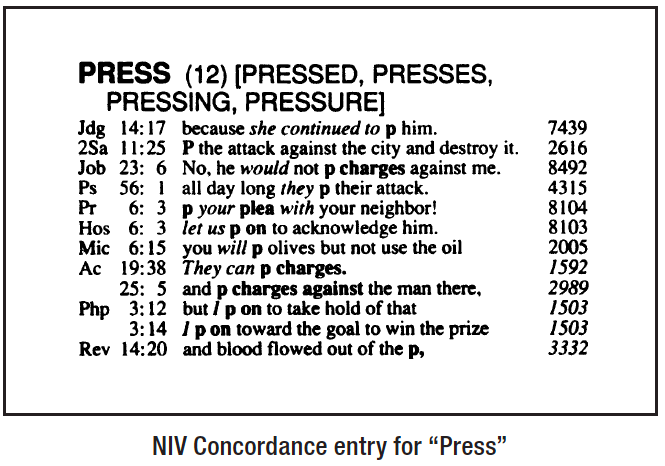
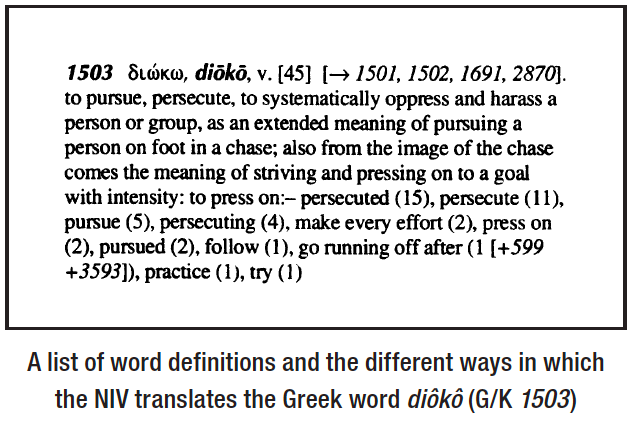
Let’s run through how to use the concordance once more, this time with an Old Testament word. Do you remember how Joseph got to Egypt? His brothers sold him to a band of Ishmaelite merchants, who took him there. In Egypt, Potiphar purchased Joseph from the Ishmaelites and eventually made Joseph his personal attendant. The story takes a sordid twist at this point. Potiphar’s wife wanted Joseph to go to bed with her, but he kept refusing.
On one occasion when he was attending to his household duties and there were no other servants around, Potiphar’s wife grabbed Joseph’s cloak and demanded that he sleep with her. Joseph ran for his life, leaving his cloak in her hand. She then called the other servants and accused Joseph of “making sport” of her (Gen. 39:14–15): “‘Look,’ she said to them, ‘this Hebrew has been brought to us to make sport of us! He came in here to sleep with me, but I screamed. When he heard me scream for help, he left his cloak beside me and ran out of the house.’”
To know more about the expression “make sport of,” look up the word “sport” in the Strongest NIV Exhaustive Concordance and locate Genesis 39:14. You will see the number 7464 to the right, which represents the number of a Hebrew word (see below).
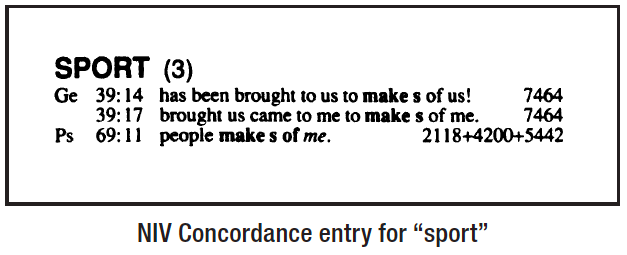
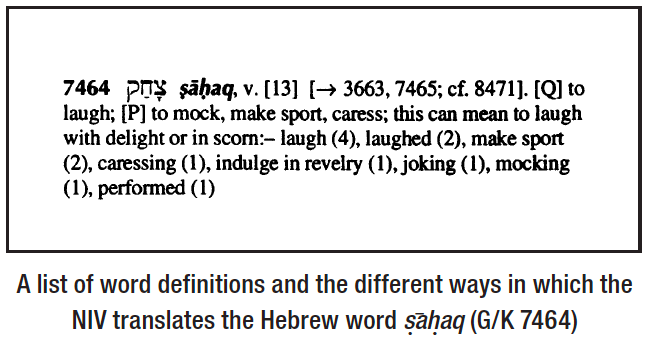
Then look up G/K number 7464 (צָחַק) in the “Hebrew to English Dictionary and Index” in the back of the concordance, and you see the various ways in which it is translated (see below).
In other words, just by using a concordance, you can discover how the original Hebrew or Greek word is translated in a modern English version of the Bible. This will often give you a sense of the original word’s range of meaning.
Context Studies
But we need to take the process one step further. What if you are studying the word “door” in the context of 2 Corinthians 2:12, where Paul says, “Now when I went to Troas to preach the gospel of Christ and found that the Lord had opened a door for me”? In the NIV the word “door” (G/K 2598—thyra) is translated “door,” “doors,” “gate,” “entrance,” “doorway,” “gates,” and “outer entrance.” But in 2 Corinthians 2:12 it is obvious that when Paul uses this word here, he is talking about an opportunity for ministry, not a physical door. In this case, even though the concordance tells you the word is translated “door” in 2 Corinthians 2:12, the meaning is not what it appears. The only way to determine what Paul means by “door” here is to look more carefully at the specific context.
That brings us to the second thing you can do to discover a word’s range of meaning. You must examine the context to see how your word is used. The one rule in doing word studies that overrules all other rules is this: Context determines word meaning. If you take any word out of its context, you cannot really tell what it means. For example, what does the word “nice” mean? Something like “kind” or “considerate”? Maybe in certain contexts, such as “He is nice.” But a change of context may change the meaning of the word (e.g., “He is nice and fat”). Even then, if the speaker is referring to a hog rather than a man, the meaning may be different. We cannot simply study a word by itself (e.g., “flesh”); we have to study a word in a particular context (e.g., “flesh” in Phil. 3:4).[14]Consequently, to be confident about knowing a word’s range of meaning, you must see how it is used in context and not just how it has been translated into English.
To check the context you need to know where the Greek or Hebrew word actually occurs in Scripture, and then you need to look up each occurrence. Checking the context is a crucial step in determining what the word could mean. Your exhaustive concordance can help you here too. Let’s look again at diôkô, translated “press on” by the NIV in Philippians 3:12.
Return to the “Greek to English Dictionary and Index” in the back of the concordance and locate G/K number 1503. This list tells you that the Greek word diôkô has been translated “persecuted” fifteen times, “persecute” eleven times, “pursue” five times, and so on. Start with the first word in the list (“persecuted”) and look it up in the main part of the concordance. When you find it, the concordance will show you three things: a Scripture reference, a line of context, and a G/K number for each occurrence (see below). Every time you see the number 1503 out to the right, you can be sure that you are looking at a translation of the Greek word diôkô.
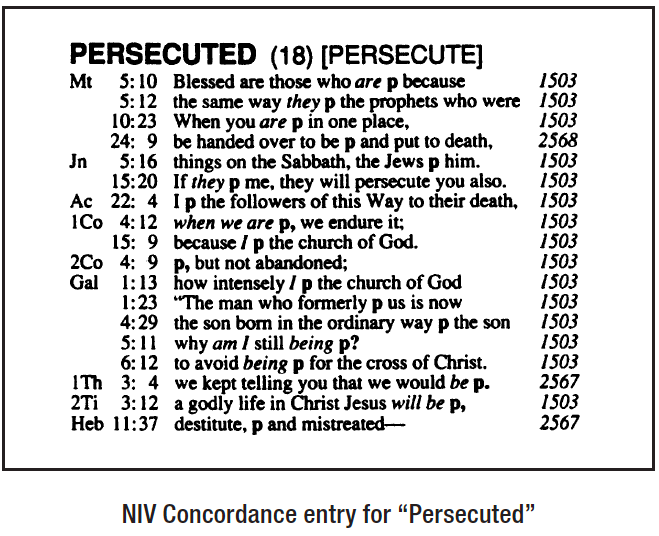
Then look up “persecute,” then “pursue,” and so on until you have looked up every word in the list of the ways the NIV translates diôkô (G/K number 1503). Remember, however, that while a concordance will show a line of context for each occurrence, this may not be enough. You may need to open your Bible and have a look at the larger context to ascertain how the word is being used. In any case, you must check the context to determine the word’s range of meaning.
As you consider the uses of diôkô in context, you begin to see a semantic range come into view:
a. to persecute (e.g., Matt. 5:10: “Blessed are those who are persecuted because of righteousness.”)b. to pursue or follow in a physical sense (e.g., Matt. 23:34: “Others you will flog in your synagogues and pursue from town to town.”)c. to pursue (in a figurative sense), strive for, seek after (e.g., Rom. 9:30: “The Gentiles, who did not pursue righteousness, have obtained it.”)
While we are at it, let’s check the context of our Old Testament example, “make sport of” in Genesis 39:14. Return to the “Hebrew to English Dictionary and Index” in the back of your concordance and locate G/K number 7464. Here you see the variety of ways the original Hebrew word has been translated into English (i.e., “laugh,” “laughed,” “make sport of,” “caressing,” and so on). Then look up every word in that list in the main part of the concordance to check the context. As you check the context for the Hebrew word (G/K 7464), you might come up with a semantic range similar to what you see below:
a. to laugh expressing doubt and disbelief (e.g., Gen. 18:13: “Then the Lord said to Abraham, ‘Why did Sarah laugh and say, ‘Will I really have a child, now that I am old?’”)b. to laugh expressing joy in a positive change of circumstances engineered by God (e.g., Gen. 21:6: “Sarah said, ‘God has brought me laughter, and everyone who hears about this will laugh with me.’”)c. to caress physically (e.g., Gen. 26:8: “When Isaac had been there a long time, Abimelek king of the Philistines looked down from a window and saw Isaac caressing his wife Rebekah.”)d. to ridicule or mock (e.g., Gen. 21:9: “But Sarah saw that the son whom Hagar the Egyptian had borne to Abraham was mocking. . . .”)e. to revel or play, perhaps in an immoral way (e.g., Ex. 32:6: “So the next day the people rose early and sacrificed burnt offerings and presented fellowship offerings. Afterward they sat down to eat and drink and got up to indulge in revelry.”)f. to joke (e.g., Gen. 19:14: “So Lot went out and spoke to his sons-in-law, who were pledged to marry his daughters. He said, ‘Hurry and get out of this place, because the Lord is about to destroy the city!’ But his sons-in-law thought he was joking.”)g. to perform entertainment (e.g., Judg. 16:25: “While they were in high spirits, they shouted, ‘Bring out Samson to entertain us.’ So they called Samson out of the prison, and he performed for them.”)
Any guesses as to which category the expression “make sport of” in Genesis 39:14 belongs?
In summary, before you decide what your word does mean, you need to determine what it could mean. You must use an exhaustive concordance to find the original Hebrew or Greek word and see its definitions and its translations into English. Then you must use the concordance again to check the context surrounding your word. Now for the final step—it’s time to decide what your word actually does mean in the context of the passage.